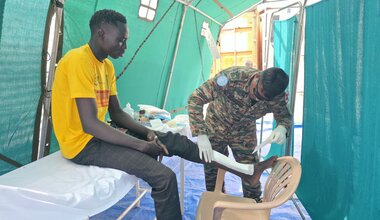Bor women demand right to equal representation in South Sudan’s justice delivery system
JONGLEI – Women and young girls have been disproportionately impacted by ongoing conflict in South Sudan.
Coupled with this, cultural norms have also contributed to women being left behind in this young nation’s political and justice landscape, revealed participants at a roundtable discussion recently facilitated by the United Nations Mission in South Sudan (UNMISS) in Bor, Jonglei.
Some 45 women were sensitized by the UN Peacekeeping mission’s Rule of Law Section on access to justice institutions and ways in which they could seek representation.
“South Sudanese women have always been many steps behind our men,” revealed Fatima Musa, Chair of the Jonglei State Women’s Association. “This workshop is a timely one, given that our country is planning elections at the end of 2024. As women making up 50 per cent of society, we need to know all our legal options as well as be well-informed about casting our votes,” she added.
The same sentiments were shared by Achol Kur Marial, Chair of the Women’s Rights Network.
“Now we are aware that women have equal access to justice like our male counterparts contrary to the more commonly held belief that women do not have the same rights.”
The workshop provided a safe space for women to express their concerns without fear of retribution. They revealed that they have limited access to statutory formal justice, and also that customary courts are biased towards men.
Lack of education was cited as another stumbling block for women as revealed by the only woman community leader at a customary court Martha Anek Agwek.
“I need more women to join and support me in the court. There is lot of potential among women in the community, but they are hampered by a lack of education. Women need to be supported with the right knowledge and resources for them to be change agents,” she said.
Another key point discussed: The 35 per cent affirmative action for women as stipulated in the Revitalized Peace Agreement of 2018.
“The 35 per cent provision hasn’t been implemented in justice delivery institutions. It must be implemented in letter and spirit for women to be represented in all levels of government. We also look forward to 50-50 representation across all public sectors,” averred Rhoda Nyankir, a leading women’s rights activist in Jonglei state.
For Victoria Yom Geu, a participant, the messages from this informative workshop should be spread far and wide to inspire and empower women across the state.
“We vow to trickle down the awareness we have received to women in all our communities for them to know that their fundamental rights as citizens of South Sudan,” she stated passionately.
William Kuol Chol, State Minister of Gender, Child and Social Welfare, for his part, affirmed the government’s position to fully implement the 35 per cent gender provision.
“We want women to play a greater role in the social, economic, and political affairs of the state. They must be well represented,” he emphasized.
 UN
UN United Nations Peacekeeping
United Nations Peacekeeping





